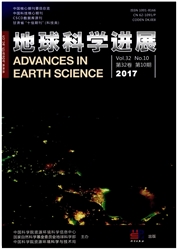

 中文摘要:
中文摘要:
热液条件下CO2和H2形成烷烃的反应,提供了自然条件下CO2转化为有机质的一条非生物途径。研究这一过程,对于油气费托非生物成因研究和海底热液生命起源的讨论具有重要意义。已有研究表明,热力学有利的温度、压强条件和合适的催化剂,是热液条件下CO2和H2发生反应形成烷烃的必需条件。在热力学有利的条件下,铬铁矿能够催化反应形成CH4、C2H6和C3H8,但还不清楚是否存在能够促使反应产生C4H10等长链烷烃的天然矿物催化剂。含一种或多种过渡金属元素的磁铁矿,可能是值得考察的对象。另外,研究热液条件下CO2和H2反应形成烷烃的过程和机理,建立反应所形成烷烃的C、H同位素综合判识指标,是今后值得探索的研究课题。
 英文摘要:
英文摘要:
It is energetically feasible for hydrocarbons to be synthesized from dissolved carbon dioxide and hydrogen under appropriate hydrothermal conditions. Hydrocarbons formed this way may contribute to oil and gas accumulation and provide the precursor organic compounds for the origin and evolution of life on the early earth. It is reported that the formation of hydrocarbons will be hampered for kinetic reasons, and CH4 and C2H6, C3H8 may produced from CO2 and H2 catalyzed by awaruite and chromite under hydrothermal conditions. More research work is needed to confirm whether there are some natural minerals which can catalysis dissolved carbon dioxide and hydrogen to produce C4H10 and other longer chain hydrocarbons. Magnetite that boars one or more other transitional metal elements may be potential. It is also needed to reveal the mechanism of the reaction and the C, H isotope fractions in this process, which may be useful to establish a criterion for discriminating the abiotic hydrocarbons formed from CO2 and H2 from those originated from organic matter under hydrothermal conditions.
 同期刊论文项目
同期刊论文项目
 同项目期刊论文
同项目期刊论文
 Microbe-related precipitation of iron and silica in the Edmond deep-sea hydrothermal vent field on t
Microbe-related precipitation of iron and silica in the Edmond deep-sea hydrothermal vent field on t Metal sources of black smoker chimneys, Endeavour Segment, Juan de Fuca Ridge: Pb isotope constraint
Metal sources of black smoker chimneys, Endeavour Segment, Juan de Fuca Ridge: Pb isotope constraint Changes in major carbon components during a fertilization experiment with surface water from the Cen
Changes in major carbon components during a fertilization experiment with surface water from the Cen Microbial diversity of a sulfide black smoker in main endeavour hydrothermal vent field, Juan de Fuc
Microbial diversity of a sulfide black smoker in main endeavour hydrothermal vent field, Juan de Fuc GeoChip-based analysis of metabolic diversity of microbial communities at the Juan de Fuca Ridge hyd
GeoChip-based analysis of metabolic diversity of microbial communities at the Juan de Fuca Ridge hyd The use of microscopy techniques to analyze microbial biofilm of the bio-oxidized chalcopyrite surfa
The use of microscopy techniques to analyze microbial biofilm of the bio-oxidized chalcopyrite surfa Diversity and Abundance of Ammonia-Oxidizing Archaea in Hydrothermal Vent Chimneys of the Juan de Fu
Diversity and Abundance of Ammonia-Oxidizing Archaea in Hydrothermal Vent Chimneys of the Juan de Fu Screening of genes regulated by cold shock in Shewanella piezotolerans WP3 and time course expressio
Screening of genes regulated by cold shock in Shewanella piezotolerans WP3 and time course expressio The abiotic formation of hydrocarbons from dissolved CO2 under hydrothermal conditions with cobalt-b
The abiotic formation of hydrocarbons from dissolved CO2 under hydrothermal conditions with cobalt-b Early-stage mineralization of hydrothermal tubeworms: New insights into the role of microorganisms i
Early-stage mineralization of hydrothermal tubeworms: New insights into the role of microorganisms i Geochemistry of REE and yttrium in hydrothermal fluids from the Endeavour segment, Juan de Fuca Ridg
Geochemistry of REE and yttrium in hydrothermal fluids from the Endeavour segment, Juan de Fuca Ridg Isolation and characterization of alkane hydroxylases from a metagenomic library of Pacific deep-sea
Isolation and characterization of alkane hydroxylases from a metagenomic library of Pacific deep-sea 期刊信息
期刊信息
